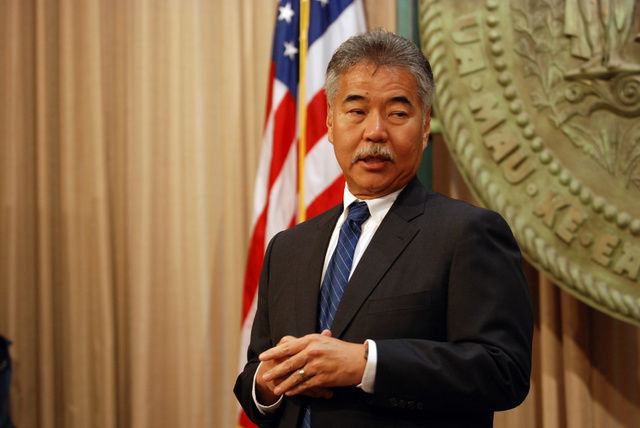HONOLULU — Jeri Di Pietro, president of Hawaii Seed and member of GMO Free Kauai, said it was an honor to spend 45 minutes with Gov. David Ige on Friday. She and about 10 other Kauai residents gathered for the
HONOLULU — Jeri Di Pietro, president of Hawaii Seed and member of GMO Free Kauai, said it was an honor to spend 45 minutes with Gov. David Ige on Friday.
She and about 10 other Kauai residents gathered for the meeting to discuss the results and recommendations from the recent release of the Kauai Joint Fact-Finding Report on pesticide use by agribusinesses on the island.
An eight-member fact finding group, funded by the state and the County of Kauai, completed the $100,000 report, released at the beginning of March.
The report calls for buffer zones around schools, restricted-use pesticide disclosure by seed companies, and tighter data collection by state agencies and lawmakers.
There were about 20 people who showed up at the meeting at the Capitol.
“We really wanted to thank the governor his part in funding the study,” Di Pietro said. “We feel good about getting that point across, and we agree with most of the findings in the report.”
She said she wasn’t sure that Ige got the complete message, however.
“He didn’t acknowledge a problem and he hadn’t read the report,” Di Pietro said. “It’s so amazing that this is such an important part of the agriculture industry and they’re uninformed of the risks and harms (of pesticides).”
But Ige, in a statement after the meeting, said his office will be looking closely into the report.
“I am reassured by the overall findings of the draft report, and my administration is looking forward to seeing the final report, which will include the community’s input,” Ige said. “Once the report has been finalized we will be considering each of the numerous recommendations carefully.”
According to a news release from GMO Free Kauai, Hawaii Seed, Hawaii Alliance for Progressive Action, and six other food and ag-related organizations, Ige didn’t comment on implementing the recommendations of the report and said he’d follow up with the group next week “to indicate which recommendations from the report he intends to implement.”
Malia Kahale’ina Chun, from Kauai, was part of the group that met with Ige as well. She’s a Native Hawaiian cultural practitioner in Kekaha and has been a voice in support of buffer zones around schools.
She says her two children tested positive for 36 different pesticides, eight of them restricted-use, and is asking for harsher guidelines on the chemicals.
“As an elected official, I am demanding that he (Ige) follow the urgent recommendations published in the government-mandated JFF report. The health and wellness of all Hawaii’s keiki and kupuna are at stake,” Chun said.
Kauai resident Lorna Cummings-Poe, one of the community members involved in Friday’s action, said the state should fulfill its duty to retrieve and collect missing data about the health impacts of these pesticides.
“We have looked to all our elected leaders far too long for the protection of our children from these chemical companies,” she said in a press release.
Hawaii Center for Food Safety Director Ashly Lukens, in a news release sent to TGI, said experts who contributed to the report are mirroring the requests of citizens in Hawaii — no-spray buffer zones, mandatory pesticide disclosure, increased data collection, monitoring and transparency.
“The time has come when those affected have had enough and demand that those in office stand up for their health and the future of their keiki,” Lukens said.
Di Pietro said the group is formally requesting another meeting with Ige, and that’s tentatively set for April 18.
“It’s not too late to change course and have a better future,” Di Pietro said.


